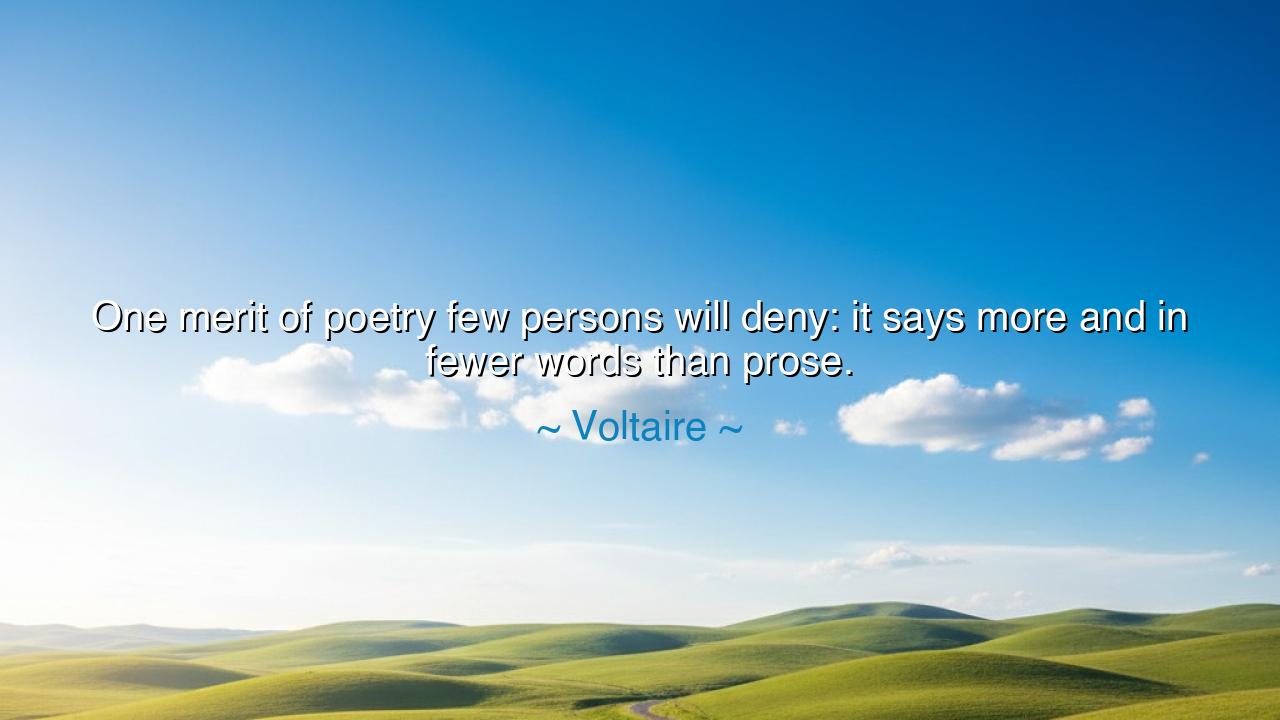
One merit of poetry few persons will deny: it says more and in






Voltaire, the fiery Enlightenment thinker, a man of wit and razor-edged reason, once spoke with piercing clarity: “One merit of poetry few persons will deny: it says more and in fewer words than prose.” In this saying, he revealed what countless generations before and after him have known—that poetry is not merely a form of writing, but the most distilled essence of speech. Where prose may wander like a river across a plain, poetry strikes like lightning, illuminating in a single flash what might take a thousand sentences to explain.
The ancients knew this power well. The oracles of Delphi did not deliver long essays; they spoke in brief, enigmatic lines whose meanings reverberated through centuries. A single phrase could guide kings and armies, shaping the fate of nations. Likewise, the Psalms of David or the proverbs of Solomon endure not because of length but because of compression: truths folded tightly, carried in a handful of words, yet expanding in the soul like seeds into mighty trees. Such is the merit Voltaire praised: poetry says more, with less.
History gives us shining examples. When Patrick Henry cried, “Give me liberty, or give me death!” he did not weave a long treatise on freedom. In seven words he captured the spirit of a revolution. When Shakespeare’s Juliet whispered, “Parting is such sweet sorrow,” she revealed in five words the paradox of love’s pain and sweetness that volumes of prose could scarcely contain. These words endure because they are poetry—compressed truth, emotion distilled into fire.
Voltaire, living in an age of reason, was no stranger to prose. He wrote essays, plays, histories, arguments that filled many volumes. Yet even he acknowledged that when the soul seeks to strike deepest, prose bends beneath the weight, while poetry lifts the burden with wings of brevity. Poetry is not weaker for its economy; it is stronger, for it carries truth like a blade honed to perfection, cutting through the fog of excess.
There is also something heroic in the discipline of poetry. To write prose is to spill ink freely, to explain, to wander. But to write poetry is to wrestle with silence, to carve away everything unnecessary, until only the essential remains. Every word must carry weight; every line must be alive. Thus the poet does not merely write—he forges, he distills, he shapes words until they glow with more meaning than their size should allow.
So what lesson must we take, children of tomorrow? It is this: do not waste words. Life is too brief for endless speech. Learn the art of compression—not only in poetry, but in all you do. Speak with care, so that your words carry weight. Write with clarity, so that your sentences strike with force. And above all, remember that greatness often lies not in saying much, but in saying little that means much.
Practical wisdom follows. When you write, challenge yourself to say the same truth in fewer words, sharpening thought into precision. When you speak, choose phrases that strike the heart rather than drown the ear. Read poetry, and let it teach you the discipline of economy. In daily life, honor silence, for silence itself is the soil from which powerful words grow.
Thus Voltaire’s words endure: “Poetry says more and in fewer words than prose.” It is the art of speaking with thunder in a whisper, of carrying universes in a line. Learn this art, and your words, like the words of the poets, will not merely be heard—they will be remembered.






VCQuach van cong
Voltaire seems to highlight one of the unique strengths of poetry: its ability to distill meaning into fewer words. I’ve noticed that reading a poem often leaves me reflecting on the lines long after I’ve finished, whereas prose can be easier to read but sometimes harder to ponder. Does this mean that poetry, by being more concise, requires a more active engagement from the reader to unpack its layers of meaning?
HP8A Hung Pham
Voltaire’s quote is intriguing because it elevates poetry’s economy of words. But sometimes, I think the richness of prose lies in its ability to explore nuances, providing a fuller picture. Can poetry ever fully replace prose in terms of depth, or is it that each form excels in its own way? I wonder if the true merit of poetry lies in its ability to suggest rather than explain.
STHoang Sa Tran
I find Voltaire’s view on poetry quite interesting, but it makes me wonder: why does poetry have this ability to say so much in so little? Is it the rhythm and structure that intensifies the meaning of each word, or is it that poetry distills the essence of a thought and leaves out the extraneous? How does this compactness impact the reader’s interpretation of poetry compared to prose?
THluong trong hieu
I completely agree with Voltaire’s point about poetry’s ability to say more with fewer words. Sometimes, a single line of poetry can evoke an entire landscape of emotions or ideas, whereas prose might need pages to describe the same thing. Does this mean poetry is inherently more profound, or is it just a different form of expression that requires more attention to language and economy of thought?
DNdat nguyen
Voltaire’s claim that poetry says more with fewer words than prose really makes me think about the power of conciseness in poetry. It’s amazing how a few carefully chosen words can convey such depth and emotion. But does this mean that prose, by its nature, is less efficient in expressing complex ideas? Or is prose just more suited to detailed exploration, while poetry captures the essence in a compact form?